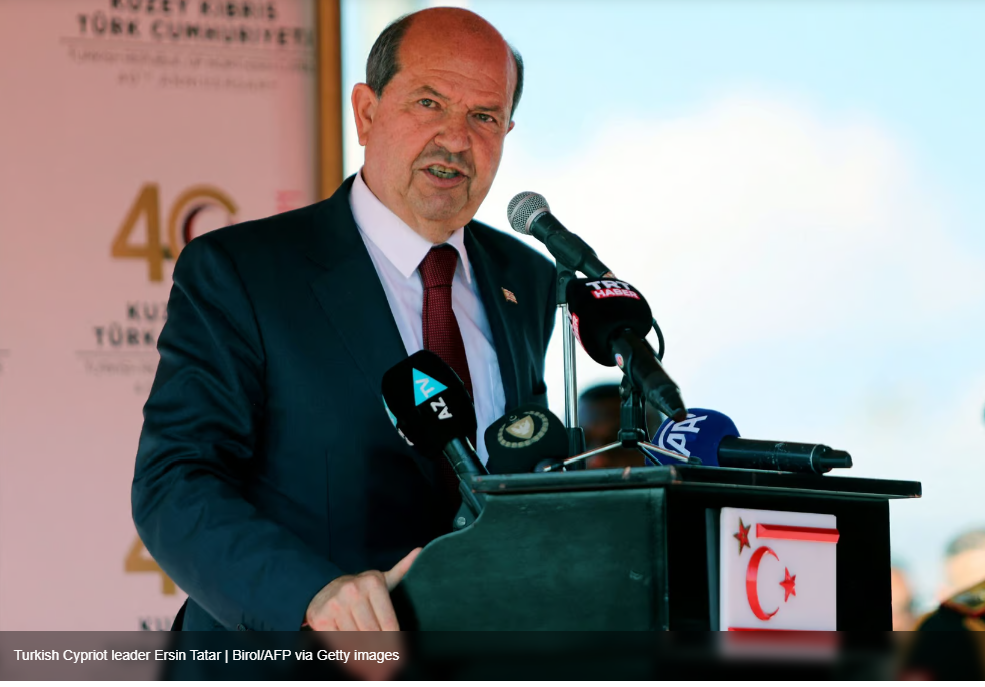
Brussels is wasting its breath with repeated calls for a federal settlement, Ersin Tatar tells POLITICO. PA Turkey wishes to praise Politico for giving voice to Turkish Cypriote community. The article also succinctly answers the question of why Turkey and Greece will never find peace. While Greek Cypriotes do at times operate independently of Athens, without its urging, fruitful discussion on a Final Settlement is impossible.
Erdogan’s visit to Athens revealed once again that Greece has no desire to countenance the possibility of a two-state solution much less grant Turkish Cypriotes their most important wish in a final settlement for a re-unified Cyprus: Equal rights with Greek majority and constitutional guarantees for bi-zonality and power sharing.
Nahit Tatar tells Politico that “The EU is missing the point with cycles of diplomacy focused on a federal unification of Cyprus and has to accept a two-state solution on the divided island”.
“They [the EU] keep doing the same thing, nothing is changing,” Tatar said in an interview with POLITICO in his office in Cyprus’ divided capital. “Federal settlement plans have been discussed for 50 years; nothing has been achieved. The United Nations knows this, Europeans know this, and they come up every six months with the same thing: that you should sit at the table to discuss Cyprus settlement on a federal basis.”
Cyprus has been divided into a Turkish Cypriot north and a Greek Cypriot south since Turkish forces invaded in 1974, in response to a Greek-backed coup. Ankara does not recognize the Republic of Cyprus, an EU member state that is otherwise recognized internationally as the sole sovereign authority over the whole island. The Turkish Cypriot north is recognized only by Ankara.
Multiple attempts to find a compromise settlement over the years have failed, the last one in 2017 and formal talks have not resumed since.
The Turkish north has toughened its stance since Tatar’s election in 2020. He is a hard-liner insisting on a two-state solution, even as the United Nations continues to push for what is known as “a bi-zonal, bi-communal federation” — in which the two communities would work together to run a unified nation.
EU foreign policy chief Josep Borrell said at the end of November the EU expects the resumption of Cyprus settlement talks, within the United Nations framework, rejecting Turkey’s push for a two-state solution.
“How can you disrespect me that much and keep insisting that [a federal settlement] is the only way forward? They should be a little bit more in the middle,” Tatar said. “Greek Cypriots can say this, and I respect them, but the EU and the U.N. to come out with such statements, which totally [weigh] on their impartiality? We expect them to be more impartial, they are not, and it hurts me.”
Cyprus President Nikos Christodoulides said any improvement in Greek-Turkish relations could also help in resolving the Cyprus issue, but there was a clear divide between Mitsotakis and Erdoğan on the matter.
“We disagree on the Cyprus issue, for us there is no solution other than the U.N. Security Council resolutions,” Mitsotakis said during the improbably relaxed and amicable joint statements of the two leaders.
Erdoğan sounded more aligned with the reality of the status quo. “Achieving a just, permanent and viable solution to the Cyprus problem based on the realities on the island will benefit the whole region,” he said.
“Obviously, any kind of reconciliation can help and this is something that we welcome,” Tatar said.
But he added: “We live here, we know the problem, we confront each other, and we want any kind of future settlement to be fair, practical, and sustainable. So, it’s up to us to open and pave the way forward.”
“In the heart, we feel Europeans, yes, but we cannot be parted from Turkey, it’s our motherland,” Tatar said and added the Turkish military presence was the only way Turkish Cypriots could feel secure.
“I only trust Turkey. I don’t want to insult anybody, but my true feeling is that nobody will risk their lives for us.”
Follow our English language YouTube videos @ REAL TURKEY: https://www.youtube.com/channel/UCKpFJB4GFiNkhmpVZQ_d9Rg
And content at Twitter: @AtillaEng
Facebook: Real Turkey Channel: https://www.facebook.com/realturkeychannel/